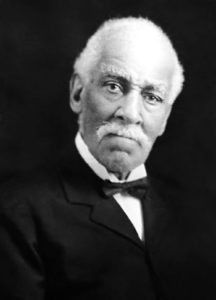
George Downing
*George T. Downing was born on this date in 1819. He was a Black abolitionist and businessman.
George Thomas Downing was born in New York City to Thomas Downing and Rebecca (West). His father, Thomas, was born in Chincoteague, Virginia, to parents freed from slavery when their master, John Downing, a prominent planter, converted to Methodism. The couple took his surname and were also Methodists. The local Methodist congregation named their meeting house in Oak Hill after Downing.
Downing hired Thomas' parents to serve as caretakers at the meeting house and provided a tutor for Thomas. Thomas grew up learning about refined tastes from guests hosted by John Downing at his home, near the land his parents were given. His son George, having heard accounts from his successful father in New York, later described these guests as the leading families of Virginia.
Thomas Downing left Virginia as a young man and went north to Philadelphia, where he met and married Rebecca West, a free black. He worked for a time at an oyster bar. By 1819, they had moved to New York. The couple had five children: George, twins Thomas and Henry, Jane, and Peter William. The Downing family attended St. Philip's Episcopal Church and became one of its wealthiest members; it was a center for men and families who were ambitious and hardworking. Thomas Downing died on April 10, 1866, several years after his wife, Rebecca.
George Downing played a role in Reconstruction politics as well. With the help of Horace Greeley, he led a delegation that met with President Andrew Johnson to push for the support of freedmen and free blacks against postwar violence and repression in the South. While organizing the delegation, he traveled throughout the South. On his way to New Orleans, he received a letter from the Ku Klux Klan which threatened his life.
Downing used his influence to help Edward Bassett gain an appointment as Minister Resident and Consul General for the United States to Haiti; it was the first appointment of a black man to a position in the Diplomatic Corps. In the late 1870s, Downing opposed Frederick Douglass's view on migration. With John Mercer Langston and Richard T. Greener at meetings and conventions, Downing supported the cause of blacks migrating from the South to the North for more opportunities. Douglass thought Exodusters and others should stay in place and work to develop the area where they were born.
He helped organize the Grand United Order of Odd Fellows and was Grand Master of the group for some years. He was also involved in freemasonry and was a Royal Arch Mason. He was an activist for black civil rights in America while building a successful career as a restaurateur in New York City, Newport, Rhode Island, and Washington, DC. His father had been an oyster seller and caterer in Philadelphia and New York City, building a business that attracted wealthy white clients.
From the 1830s until the end of slavery, Downing was active in the Underground Railroad, using his restaurant as a rest station for slaves on the move. He built a summer season business in Newport and made it his home. He worked to integrate Rhode Island public schools for more than ten years. During the American Civil War, Downing helped recruit African American soldiers.
After the war, Downing moved to Washington, DC, where he ran the Refectory for the House of Representatives for a dozen years. He was a prominent member of the Colored Conventions Movement and worked to join the efforts of women's rights and black rights. He became friends with Senator Charles Sumner and was with the legislator when he died. He returned to Rhode Island late in life, where he continued as a community leader and civil rights activist. George T. Downing died in Newport, Rhode Island, on July 21, 1903. 2003, Downing was inducted into the Rhode Island Heritage Hall of Fame.